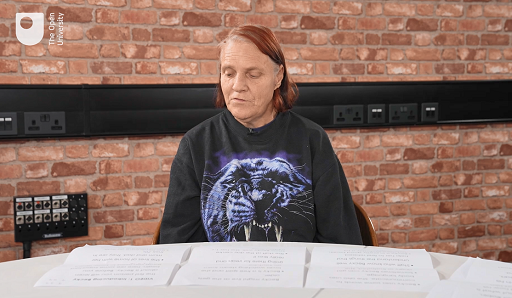1 Introducing Becky
In this case study, you will meet Becky who is 45, has learning disabilities and currently lives at home with her parents.
Activity 1 Learning about Becky’s life
Watch the video below to find out more about Becky and her life.

Transcript
Read the longer vignette about Becky which provides some more details about her life. As you read, make notes on any particular issues that the professionals supporting Becky and her family should consider as part of planning ahead for older age:
Becky’s story
Becky lives with her parents and goes to a day centre on weekdays. She is 45. Becky loves to be outside and in nature. She also likes watching people, trains and buses. She is independent and strong minded, her mother says she is ‘her own person’ and her support staff describe Becky as a ‘free spirit’, who sometimes does not care for societal norms and conventions. She has been known to walk out of stores with some items without paying for them or taken her sister’s birthday presents into the day centre and left them there.
Becky likes watching movies, but her new favourite thing is watching videos of steam trains on YouTube. She likes to carry a shopping bag with her into which she puts things that she likes. This might include a basketball, empty burger boxes, drinks cans and crisp packets. Becky likes how they shine and crinkle.
Becky goes to a day activities centre four times a week, where she has one-on-one support. Some of her staff have supported Becky for years and know her very well. Becky’s communicates with some words, but generally her staff rely on her body language and facial expressions. In the past, Becky could have become very angry and thrown herself on the ground. This has not happened for a long time, and she is generally a very relaxed and happy person. Becky’s parents think that she had behaved like that in moments of frustration or when feeling misunderstood.
In Becky’s annual review there is a risk assessment that identified potential ‘hazards’ when supporting Becky, such as ‘Community support – behavioural changes: spitting, kicking, grabbing, stealing. Becky can display these behaviours if she is unhappy’. There is a ‘RISK’ associated to that: ‘Becky’s change in behaviour could harm her or a member of staff. Becky’s behaviour might cause members of the public to react badly to her’. The document clarified what the service is doing to reduce that risk, for example:
- Becky has 1-1 support which enables staff to keep a close eye on her at all times.
- Staff make sure Becky understands where she is going and the activity she is doing.
- Staff must not take Becky to places that are too busy.
- If Becky is upset, staff should take her away from the situation or environment as quickly as possible. If Becky refuses to move, staff should give her space and allow her to calm down to reduce the likelihood of her to react with the above behaviours.
- Staff should not use the word ‘No’ with Becky.
Despite this, communication between Becky and her support team flows smoothly these days. Becky is good at communicating her personal care needs and making her preferences known.
Becky’s parents, who are both in their seventies, are planning for her future, and hope that she can continue to be supported by the provider who supports her now at the day service and perhaps move into an independent supported living setting with them. Becky does not have any significant health needs at the moment, but she is overweight.
Discussion
There are many potential issues that you may have identified for Becky and her family. Some of the key points that require further consideration include: how can Becky be included in discussions about her future, for example, where she might live as she gets older? Becky’s family will most likely benefit from some additional support and advice about the options available to Becky, but which professionals and organisations could they approach for support? Becky is clearly happy and relaxed with her current day services provider – how can this good practice and knowledge of Becky be shared if she decides to move house with support in place? And finally, how can healthcare professionals support Becky to maintain a healthy life style as she gets older, particularly as she approaches menopause for example?
